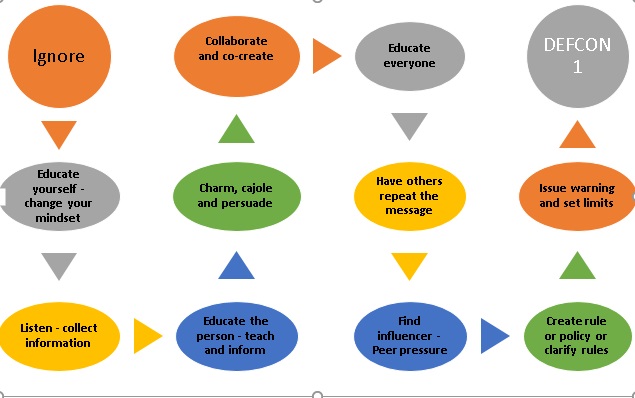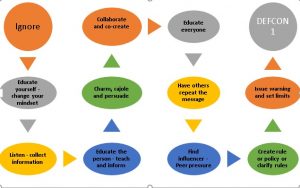Catalyst conversations – raising issues in a way people will listen

The other day I was a pedestrian on the sidewalk waiting for the traffic light to turn green.
Up rode a young guy on a bicycle – on the sidewalk. Honestly, I hadn’t noticed he was on the sidewalk. But a woman next to me did. And she instantly tore into him.
“How dare you be on the sidewalk?” “This is so dangerous!” “You are going to upset elderly people on the sidewalk!” “What about little kids”? “You are so selfish!” “Get off!” “Seriously get off your bike!” etc. etc.
She was screaming.
The young guy completely ignored her at first. Then he turned to her and smiled and said. “Thank you.” “Oh, aren’t you nice?” “Have a nice day.”
The light changed.
He rode off laughing – on the sidewalk!
And as I watched him ride away I noticed he was being dangerous. He was weaving between pedestrians. He was riding really fast into oncoming morning commuters. I would have been scared if he was riding toward me like that.
And I thought to myself, “That lady was right. He really shouldn’t have been on the sidewalk on his bike.” But then I also realized he didn’t hear a word she had to say. When she started yelling at him, he completely shut down. And sadly for the rest of the people on the sidewalk – he did not change his behaviour. If anything, he might have become worse in the short term. Emboldened by his defiance.
What examples can you think of in your workplace where raising a legitimate issue of concern fell flat?
In health care and in law, it seems every day we are raising really important issues of concern for people who may not want to hear our message but who really need to. I call these “catalyst conversations“. We hold (or perceive we hold) the responsibility to convey an important warning to alert someone they need to change. And if they don’t listen or hear our warnings there can be serious consequences. Health care providers and administrators and lawyers are often the bearers of bad news and the teachers of tough lessons.
Remember this recent case of the woman at a health clinic who was yelling racist comments about wanting to see a “white doctor” and getting increasingly angry that only “brown doctors with brown teeth” were available?
I heard three different responses to that story:
I hear that stuff all the time – and we just have to put up with it.
That’s illegal – they should have called police.
Yikes. There is nothing you can do in that case. Hope it doesn’t happen at our place. What are you supposed to do when that happens? I don’t know what I would have said.
So in the face of highly inappropriate or dangerous behaviour what are we to do?
When presented with these kinds of situations, we often think there are only two choices
- Ignore. Stay silent. Say nothing. Hope the issue goes away.
- Go DEFCON 1 – super nova response. Rip into someone at level 10 immediately. Ban them. Call police. Start a lawsuit. Make the issue go away.
And frankly, sometimes those responses are okay. Short term ignoring and silence can be powerful. And in the face of true danger or violence, sometimes yelling a strong warning or calling police or taking legal action are our only safe options.
But, health leaders cannot operate in this either/or zone exclusively.
If you only ever ignore highly inappropriate and dangerous behaviour, you become complicit and you fail to be an ally and you contribute to an unsafe environment.
If in response to every problem you always go DEFCON 1, you do not leave yourself any room to go. You shut down all conversation. You blaze the earth. You see the other person as a foe and there is no opportunity for collaborative discussion. If you declare war – you have to follow through.
Ignoring and DEFCON 1 are over and underutilized powers.
In health care and law we live in a grey zone. Often there is no perfect result or answer to a challenging situation involving our team members or patients, residents, clients and others who we believe “need to change”. And our professionalism requires us to remember more options from our respectful engagement toolbox if we are going to be catalysts for change.
What is the continuum of options?

Respectful Engagement Options
- Ignore
- Educate yourself – change your mindset
- Listen – collect information
- Educate the person – teach and inform
- Charm, cajole, and persuade
- Collaborate and co-create
- Educate everyone
- Have others repeat the message
- Find influencer – peer pressure
- Create rule or policy or clarify rules
- Issue warning and set limits
- DEFCON 1: ban, call police, issue lawsuit, shutdown communication
If you want to influence change and engage in catalyst conversations, how would thinking through these options help you feel more equipped to deal with challenging situations?